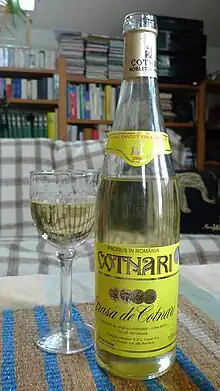| Grasă de Cotnari | |
|---|---|
| Grape (Vitis) | |
 Semi-sweet Grasa de Cotnari | |
| Color of berry skin | Blanc |
| Species | Vitis vinifera |
| Origin | Romania |
| Notable regions | Romania |
| VIVC number | 4948 |
Grasă de Cotnari (Romanian pronunciation: [ˈɡrasə de kotˈnarʲ]) is a Romanian wine variety associated with the Cotnari wine region, in Iași County (historical region of Moldavia), where it has been grown ever since the rule of Prince Stephen the Great (1457–1504).
Grape is characterized by its relatively large big berries.
Wine styles
Grasă de Cotnari is usually a botrytised sweet wine (although semi-sweet varieties are also made) and usually has a high residual sugar content, sometimes as much as 300g/liter.[1] The harvest of 1958 reached the maximal sugar content in the history of this wine of about 520g/liter.
With the general decline in demand for sweet wines after the Second World War and bad wine making during the communist era,[2] mainly produced for the Soviet Union,[3] Grasă de Cotnari became largely forgotten in the international wine market. Even today it is seldom available, although the offered qualities have improved considerably.[3]
The wine is made primarily from a grape variety also called Grasă de Cotnari.[4] or Grasă (an old white grape cultivated in the Furmint group), although some additional Fetească Alba is allowed. It is produced from grapes that fully reached and exceeded their maturity, hence the high residual sugar content. It is suitable for making aszú wines in Hungary where it is called Kövérszőlő.
A carefully made Grasă de Cotnari is a golden yellow wine, and in spite of its residual sweetness should retain a fine acid structure and 11,5-14% alcohol by volume. It ages well, its color darkens from pale yellow to reach a dark yellow with an orange note in it. A good Grasă de Cotnari should have a distinct bouquet of apricot, walnut and almond and should be drunk chilled at about 10-12 degrees Celsius.
Relationship to other grapes
The grape variety Grasa is known as Kövérszőlő (Hungarian: fat grape) in Tokaj, Hungary.[5] These two grape varieties are identical.[6]
External links
- Cotnari Vineyard Website
- About COTNARI
- Cotnari Wine House of Iasi at agerpres.ro
References
- ↑ "Vin Grasa de Cotnari sau Regina Vinurilor romanesc". Archived from the original on 2011-03-04. Retrieved 2011-07-31.
- ↑ Robinson, Jancis.Das Oxford Weinlexikon. Gräfe & Unzer, München, 2003,
- 1 2 Sweet wines starting to trickle out of Romania at japantimes.co.jp
- ↑ Grasa de Cotnari Archived 2012-05-06 at the Wayback Machine, Vitis International Variety Catalogue, accessed 2010-11-24
- ↑ "Vin Istoria vinului Grasa de Cotnari romanesc". Archived from the original on 2011-03-04. Retrieved 2011-07-31.
- ↑ Investigation of the cultivation value and the relations of origin of old grapevine cultivars in Tokaj